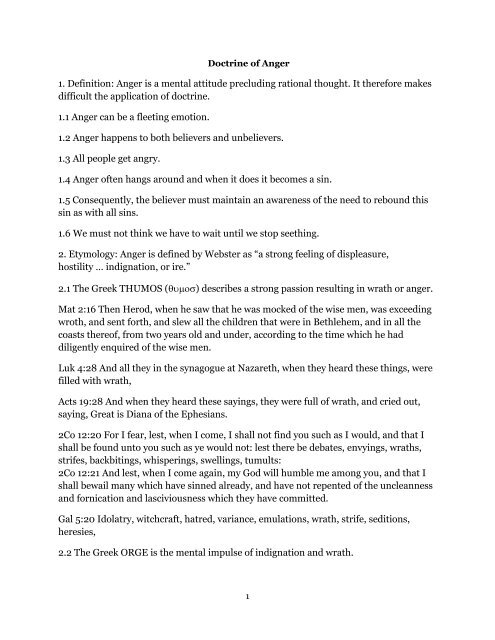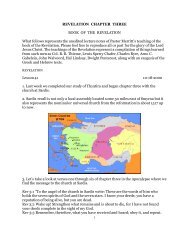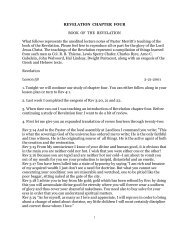Doctrine of Anger0612.pdf - Westbank Bible Church Home
Doctrine of Anger0612.pdf - Westbank Bible Church Home
Doctrine of Anger0612.pdf - Westbank Bible Church Home
Create successful ePaper yourself
Turn your PDF publications into a flip-book with our unique Google optimized e-Paper software.
<strong>Doctrine</strong> <strong>of</strong> Anger<br />
1. Definition: Anger is a mental attitude precluding rational thought. It therefore makes<br />
difficult the application <strong>of</strong> doctrine.<br />
1.1 Anger can be a fleeting emotion.<br />
1.2 Anger happens to both believers and unbelievers.<br />
1.3 All people get angry.<br />
1.4 Anger <strong>of</strong>ten hangs around and when it does it becomes a sin.<br />
1.5 Consequently, the believer must maintain an awareness <strong>of</strong> the need to rebound this<br />
sin as with all sins.<br />
1.6 We must not think we have to wait until we stop seething.<br />
2. Etymology: Anger is defined by Webster as “a strong feeling <strong>of</strong> displeasure,<br />
hostility … indignation, or ire.”<br />
2.1 The Greek THUMOS () describes a strong passion resulting in wrath or anger.<br />
Mat 2:16 Then Herod, when he saw that he was mocked <strong>of</strong> the wise men, was exceeding<br />
wroth, and sent forth, and slew all the children that were in Bethlehem, and in all the<br />
coasts there<strong>of</strong>, from two years old and under, according to the time which he had<br />
diligently enquired <strong>of</strong> the wise men.<br />
Luk 4:28 And all they in the synagogue at Nazareth, when they heard these things, were<br />
filled with wrath,<br />
Acts 19:28 And when they heard these sayings, they were full <strong>of</strong> wrath, and cried out,<br />
saying, Great is Diana <strong>of</strong> the Ephesians.<br />
2Co 12:20 For I fear, lest, when I come, I shall not find you such as I would, and that I<br />
shall be found unto you such as ye would not: lest there be debates, envyings, wraths,<br />
strifes, backbitings, whisperings, swellings, tumults:<br />
2Co 12:21 And lest, when I come again, my God will humble me among you, and that I<br />
shall bewail many which have sinned already, and have not repented <strong>of</strong> the uncleanness<br />
and fornication and lasciviousness which they have committed.<br />
Gal 5:20 Idolatry, witchcraft, hatred, variance, emulations, wrath, strife, seditions,<br />
heresies,<br />
2.2 The Greek ORGE is the mental impulse <strong>of</strong> indignation and wrath.<br />
1
Mar 3:4 And he saith unto them, Is it lawful to do good on the sabbath days, or to do<br />
evil? to save life, or to kill? But they held their peace.<br />
Mar 3:5 And when he had looked round about on them with anger, being grieved for the<br />
hardness <strong>of</strong> their hearts, he saith unto the man, Stretch forth thine hand. And he<br />
stretched it out: and his hand was restored whole as the other.<br />
Luk 21:23 But woe unto them that are with child, and to them that give suck, in those<br />
days! for there shall be great distress in the land, and wrath upon this people.<br />
2.2.1 ORGE can also mean judicial punishment or discipline, as found in Paul’s<br />
admonishment to submit to the authorities <strong>of</strong> the land.<br />
Rom 13:4 For he is the minister <strong>of</strong> God to thee for good. But if thou do that which is evil,<br />
be afraid; for he beareth not the sword in vain: for he is the minister <strong>of</strong> God, a revenger<br />
to execute wrath upon him that doeth evil.<br />
Rom 13:5 Wherefore ye must needs be subject, not only for wrath, but also for<br />
conscience sake.<br />
Rom 13:6 For this cause pay ye tribute also: for they are God's ministers, attending<br />
continually upon this very thing.<br />
2.2.2 ORGE is an emotion common to the human race. The admonition <strong>of</strong> Eph 4:26 is to<br />
not let anger become a sin. In Eph 4:26 the word for wrath is PARAGISMOS, meaning a<br />
wrath yielding "frustration and exasperation." We will see more <strong>of</strong> PARAGISMOS later<br />
in this doctrine.<br />
Eph 4:26 Be ye angry, and sin not: let not the sun go down upon your wrath:<br />
2.2.3 In Eph 4:31 and Col 3:8 we see how similar ORGE and THUMOS are in meaning<br />
and application.<br />
Eph 4:31 Let all bitterness, and wrath (THUMOS), and anger (ORGE) and clamour, and<br />
evil speaking, be put away from you, with all malice:<br />
Col 3:8 But now ye also put <strong>of</strong>f all these; anger (ORGE), wrath (THUMOS), malice,<br />
blasphemy, filthy communication out <strong>of</strong> your mouth.<br />
2.3 With reference to the difference between THUMOS and ORGE: ORGE signifies the<br />
spirit panting, as it were, in the body with rage, passion and heat.<br />
2.3.1 On the other hand, THUMOS can signify indignation which has arisen gradually<br />
and has become settled. ORGE also means the “natural juices” that flow and seethe, as<br />
in the immediate emotional response to a precipitate situation.<br />
2.3.2 In summary, these two words represent the emotion <strong>of</strong> anger or indignation which<br />
must be nipped in the bud at the mental attitude level. This is only done by rebound.<br />
2
2.3.3 As we have seen in Rom 13:4, ORGE over time came also to mean judicial<br />
punishment, which is not a sin.<br />
2.3.4 Notice how ORGE is used to describe what a pastor-teacher should not be, i.e.,<br />
“not soon angry.”<br />
Tit 1:7 For a bishop must be blameless, as the steward <strong>of</strong> God; not selfwilled, not soon<br />
angry (ORGE), not given to wine, no striker, not given to filthy lucre;<br />
2.4 ANAPH in the Hebrew means to breathe through the nose, like the snorting <strong>of</strong> a<br />
bull; it also means anger as a strong feeling <strong>of</strong> indignation. It is an onomatopoeic word<br />
like buzz. In the case <strong>of</strong> ANAPH, the bull or cow when angry and preparing to charge<br />
<strong>of</strong>ten makes a sound like ANAPH. Notice how ANAPH is used first with reference to<br />
Judah in Egypt when speaking to Joseph, and Jacob’s description <strong>of</strong> Simeon and Levi in<br />
their dealing with the men <strong>of</strong> Shechem.<br />
Gen 44:18 Then Judah came near unto him, and said, Oh my lord, let thy servant, I pray<br />
thee, speak a word in my lord's ears, and let not thine anger burn against thy servant: for<br />
thou art even as Pharaoh.<br />
Gen 44:19 My lord asked his servants, saying, Have ye a father, or a brother?<br />
Gen 44:20 And we said unto my lord, We have a father, an old man, and a child <strong>of</strong> his<br />
old age, a little one; and his brother is dead, and he alone is left <strong>of</strong> his mother, and his<br />
father loveth him.<br />
Gen 44:21 And thou saidst unto thy servants, Bring him down unto me, that I may set<br />
mine eyes upon him.<br />
Gen 49:5 Simeon and Levi are brethren; instruments <strong>of</strong> cruelty are in their<br />
habitations …<br />
Gen 49:7 Cursed be their anger, for it was fierce; and their wrath, for it was cruel: I<br />
will divide them in Jacob, and scatter them in Israel.<br />
2.4.1 Simeon and Levi, Jacob’s second and third sons by Leah, were brothers in violence.<br />
Jacob could never forget their cruel massacre <strong>of</strong> the Shechemites.<br />
2.4.2 They revealed their true characters that day, for they violently attacked and<br />
destroyed men they had previously made helpless by strategy and deceit. At that time<br />
they were censured by their father.<br />
2.5 PAROGISMOS in the Greek means wrath and indignation, characterized by<br />
frustration and exasperation, i.e. that emotion <strong>of</strong> anger which seethes alongside.<br />
2.5.1 It is used in Eph 4:26 to explain what we are to avoid.<br />
Eph 4:26 Be ye angry, and sin not: let not the sun go down upon your wrath:<br />
3
3. It is not a sin to experience the emotion <strong>of</strong> anger, unless we permit the emotion to<br />
continue and thereby prevent proper thinking and/or action.<br />
3.1 God being “slow to anger” is an anthropopathism.<br />
Neh 9:17 And refused to obey, neither were mindful <strong>of</strong> thy wonders that thou didst<br />
among them; but hardened their necks, and in their rebellion appointed a captain to<br />
return to their bondage: but thou art a God ready to pardon, gracious and merciful, slow<br />
to anger (APH), and <strong>of</strong> great kindness, and forsookest them not.<br />
3.2 In general, usage in the English <strong>Bible</strong> distinguishes anger from wrath, the latter<br />
being the more explosive, as an active manifestation <strong>of</strong> displeasure.<br />
4. Anger results in self-induced misery and failure; it also hurts others.<br />
4.1 Both “overt and sneaky” anger need to be named as sin if we are to maintain<br />
fellowship. By sneaky, or repressed anger, I mean that anger resident in your soul but<br />
never expressed, or that described by the axiom “Many an unkind word is said in jest.”<br />
Pro 21:19 It is better to dwell in the wilderness, than with a contentious and an angry<br />
woman.<br />
Pro 22:24 Make no friendship with an angry man; and with a furious man thou shalt not<br />
go:<br />
Pro 25:24 It is better to dwell in the corner <strong>of</strong> the housetop, than with a quarrelsome<br />
wife and in a wide house.<br />
Pro 29:22 An angry man stirs up dissension, and a hot-tempered one commits many<br />
sins.<br />
Ecc 7:9 Do not be quickly provoked in your spirit, for anger resides in the lap <strong>of</strong> fools.<br />
5. Anger and wrath are related and replete with cruelty.<br />
Pro 27:4 Wrath is cruel and anger is overwhelming, but who can stand before jealousy?<br />
5.1 Wrath in Pro 27:4 is CHEMAH, meaning furious heat-- unbridled anger. Anger is<br />
APH, from ANAPH, meaning a strong feeling <strong>of</strong> anger and indignation. CHEMAH<br />
would seem to describe that held within, whereas APH would seem to describe<br />
expressed anger--the bull is about to charge.<br />
6. Uncontrolled anger can certainly frustrate the ministry <strong>of</strong> a believer.<br />
1Ti 2:8 I will therefore that men pray every where, lifting up holy hands, without wrath<br />
and doubting.<br />
4
7. Anger leads to revenge when it goes underground. The story <strong>of</strong> Absalom avenging<br />
Tamar by murdering Amnon is an example.<br />
2Sa 13:22 And Absalom spake unto his brother Amnon neither good nor bad: for<br />
Absalom hated Amnon, because he had forced his sister Tamar.<br />
2Sa 13:23 And it came to pass after two full years, that Absalom had sheepshearers in<br />
Baalhazor, which is beside Ephraim: and Absalom invited all the king's sons.<br />
2Sa 13:24 And Absalom came to the king, and said, Behold now, thy servant hath<br />
sheepshearers; let the king, I beseech thee, and his servants go with thy servant.<br />
2Sa 13:25 And the king said to Absalom, Nay, my son, let us not all now go, lest we be<br />
chargeable unto thee. And he pressed him: howbeit he would not go, but blessed him.<br />
2Sa 13:26 Then said Absalom, If not, I pray thee, let my brother Amnon go with us. And<br />
the king said unto him, Why should he go with thee?<br />
2Sa 13:27 But Absalom pressed him, that he let Amnon and all the king's sons go with<br />
him.<br />
2Sa 13:28 Now Absalom had commanded his servants, saying, Mark ye now when<br />
Amnon's heart is merry with wine, and when I say unto you, Smite Amnon; then kill<br />
him, fear not: have not I commanded you? be courageous, and be valiant.<br />
2Sa 13:29 And the servants <strong>of</strong> Absalom did unto Amnon as Absalom had commanded ...<br />
8. Anger is ever present in churches full <strong>of</strong> people negative to the Word <strong>of</strong> God.<br />
2Co 12:20 For I fear, lest, when I come, I shall not find you such as I would, and that I<br />
shall be found unto you such as ye would not: lest there be debates, envyings, wraths,<br />
strifes, backbitings, whisperings, swellings, tumults:<br />
8.1 In 2Co 12:20 THUMOS is the word translated “wraths.”<br />
9. Anger characterizes the life <strong>of</strong> a reversionist.<br />
Gal 5:19 Now the works <strong>of</strong> the flesh are manifest, which are these; Adultery, fornication,<br />
uncleanness, lasciviousness,<br />
Gal 5:20 Idolatry, witchcraft, hatred, variance, emulations, wrath, strife, seditions,<br />
heresies,<br />
9.1 In Gal 5:20 the word translated “wrath” is THUMOS.<br />
10. We are therefore to put <strong>of</strong>f anger and wrath as part <strong>of</strong> the maturing process.<br />
Eph 4:31 Let all bitterness, and wrath, and anger, and clamour, and evil speaking, be<br />
put away from you, with all malice:<br />
Eph 4:32 And be ye kind one to another, tenderhearted, forgiving one another, even as<br />
God for Christ's sake hath forgiven you.<br />
5
11. Fury is used in Scripture to express the burning anger and rage <strong>of</strong> man. It is also used<br />
<strong>of</strong> God in the sense <strong>of</strong> an anthropopathism. Examples:<br />
11.1 The fury <strong>of</strong> man<br />
Gen 27:43 Now therefore, my son, obey my voice; arise, flee thou to Laban my brother to<br />
Haran;<br />
Gen 27:44 And tarry with him a few days, until thy brother's fury turn away;<br />
Est 1:10 On the seventh day, when the heart <strong>of</strong> the king was merry with wine, he<br />
commanded Mehuman, Biztha, Harbona, Bigtha, and Abagtha, Zethar, and Carcas, the<br />
seven chamberlains that served in the presence <strong>of</strong> Ahasuerus the king,<br />
Est 1:11 To bring Vashti the queen before the king with the crown royal, to shew the<br />
people and the princes her beauty: for she was fair to look on.<br />
Est 1:12 But the queen Vashti refused to come at the king's commandment by his<br />
chamberlains: therefore was the king very wroth, and his anger burned in him.<br />
11.2 The fury <strong>of</strong> God<br />
1Sa 4:3 The ox knoweth his owner, and the ass his master's crib: but Israel doth not<br />
know, my people doth not consider.<br />
1Sa 4:4 Ah sinful nation, a people laden with iniquity, a seed <strong>of</strong> evildoers, children that<br />
are corrupters: they have forsaken the LORD, they have provoked the Holy One <strong>of</strong> Israel<br />
unto anger, they are gone away backward.<br />
Psa 145:8 The LORD is gracious, and full <strong>of</strong> compassion; slow to anger, and <strong>of</strong> great<br />
mercy.<br />
6




